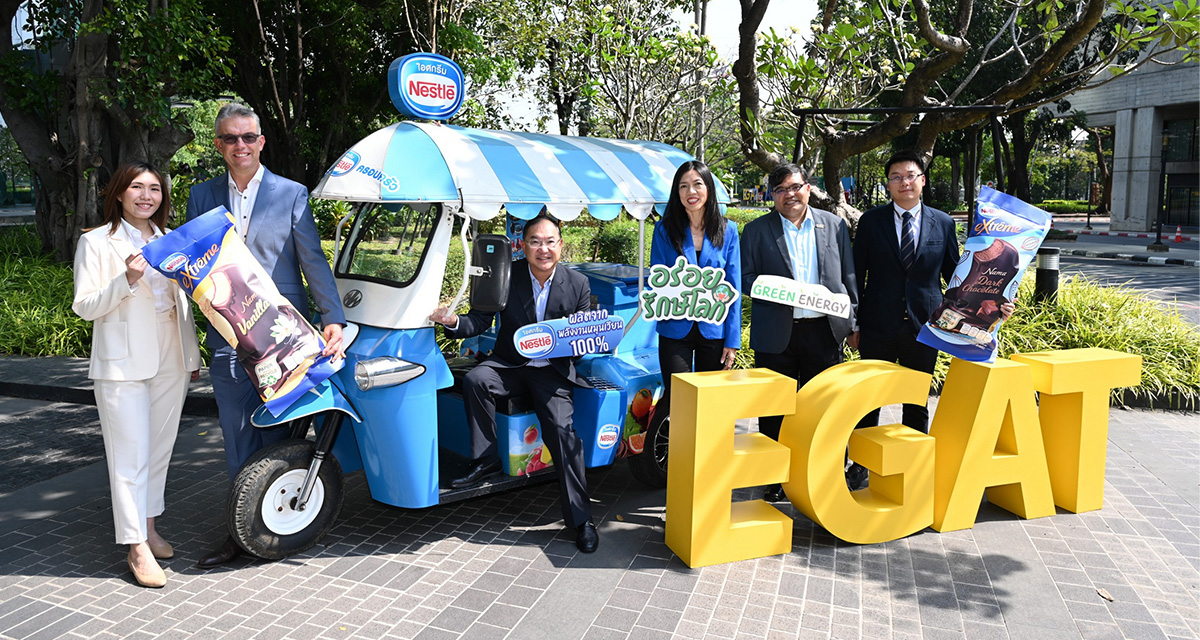Nestlé Ice Cream moves forward to 100% renewable-powered production, the first FMCG company in Thailand to collaborate with EGAT in Utility Green Tariff project

Nestlé Ice Cream, under Nestlé (Thai) Ltd., will become a pioneer in ice-cream production by using 100% renewable energy under a new pilot project with EGAT that will take place throughout 2023. This makes Nestlé the first FMCG company in Thailand to shift to renewable energy in EGAT’s Utility Green Tariff sandbox project. The transition to green energy will help Nestlé reduce carbon emissions and move the company closer to achieving Net Zero emissions by 2050.
This green energy initiative is a major collaboration involving Nestlé (Thai) Ltd., the Electricity Generating Authority of Thailand (EGAT), and Innopower Co., Ltd. The production of ice cream at Nestlé’s Bangchan Factory will be powered by green energy throughout 2023, delivering the ice cream that cares for consumers and also the planet as it helps to cool down the temperature.
In addition to adopting renewable energy, Nestlé’s Ice Cream Business has implemented other carbon reduction initiatives such as switching to eco-friendly ice cream freezers and using electric tricycles as mobile units. The company has also switched to paper packaging for Nestlé Extreme Nama and Nestlé Kit Kat products. This is in response to Article 7 in the United Nations’ Sustainable Development Goals (SDGs) on access to affordable, sustainable energy, as well as Articles 12 and 13 regarding responsible production and consumption and global warming solutions.
Mr. Victor Seah, Chairman and CEO, Nestlé Indochina, said, “Nestlé has an ambition to achieve zero greenhouse gas emissions, or net zero, by 2050. Part of our sustainability roadmap is to achieve the goal of using 100% renewable electricity at all our production sites by 2025. Today, I am very pleased and honored to collaborate with EGAT to have our Nestlé Ice Cream Factory powered by 100% green electricity from renewable sources. Nestlé Ice Cream is the first FMCG business in Thailand to receive a consistent supply of green energy throughout the year under the Utility Green Tariff. As the largest food and beverage company in the world, Nestlé understands our manufacturing operations have a significant footprint. Today is a huge milestone in our journey to make Thailand and the world a more sustainable place to live in.”
Mr. Warit Rattanachuen, Assistant Governor – Research, Innovation, and Business Development at the Project Management Office of the Electricity Generating Authority of Thailand (EGAT), said, “This collaboration between Nestlé Thailand and EGAT is a significant step in advancing the use of electricity supplied from renewable energy in the food industry, a key industry that is close to consumers. This initiative originates from an alliance that participated in an experimental project to supply electricity from renewable energy called the Utility Green Tariff. It’s under the ERC Sandbox Project, Phase 2, which will last for one year with a goal to create a standard for energy innovation.”
“EGAT will serve as the Arrangement Unit providing management services for matching mechanisms for green power generation that specifies a Green Energy Portfolio in accordance with the Nestlé Ice Cream factory's actual daily electricity demand. It is delivered with a Renewable Energy Certificate (REC) that matches production sites and the quantity of power consumed to test a new green power supply model for EGAT that will promote and elevate the Thai green power sector to international standards. This includes support for the business sector in providing green power services that drive the transition to green electricity and enhance Thailand’s economic competitiveness with environmentally friendly electrical energy innovations in the future,” he added.
This collaboration to adopt green energy marks a significant step for the country in transitioning to electricity generated from renewable sources, which will help ensure a livable world and give the next generation a brighter future.



